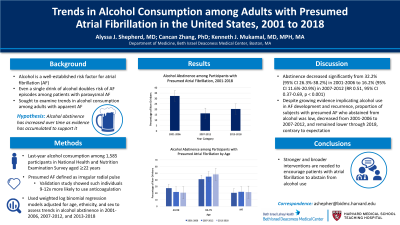Other
Trends in Alcohol Consumption Among Adults with Presumed Atrial Fibrillation in the United States

Kenneth Mukamal, MD, MPH, MA – Academic Researcher/Associate Professor, Medicine, Beth Israel Deaconess Medical Center; Cancan Zhang, PhD – Statistician, Medicine, Beth Israel Deaconess Medical Center
Purpose: Alcohol is well-established risk factor for the development of atrial fibrillation (AF), and even a single drink of alcohol doubles the risk of AF episodes among patients with paroxysmal AF. We sought to examine trends in alcohol consumption among adults with apparent AF, with the hypothesis that alcohol abstinence would increase as growing evidence has emerged to support it.
Material and Methods: Self-reported alcohol consumption was evaluated among 1,585 participants in the National Health and Nutrition Examination Survey (NHANES) age >21 from 2001-2018 with presumed AF. Presumed AF was defined as the presence of an irregular radial pulse palpated during clinical examination; in a validation study, such individuals were 9-12 times more likely than others to be using concomitant anticoagulants. To accommodate the complex survey design, we utilized a weighted log binomial regression model adjusted for age, race, and sex to assess trends in alcohol abstinence in time periods of 2001-2006, 2007-2012, and 2013-2018.
Results: Contrary to our hypothesis, the proportion of adults with presumed AF who reported abstinence from alcohol decreased significantly from 32.2% (95% CI 26.3%-38.2%) in 2001-2006 to 16.2% (95% CI 11.6%-20.9%) in 2007-2012 (RR 0.51, 95% CI 0.37-0.69, p < 0.001). Abstinence was approximately stable from 2007-2012 to 2013-2018 with abstinence reported in 20.2% (95% CI 14.5%-26.0%) of subjects (RR 1.23, 95% CI: 0.88-1.72, p = 0.23).
Conclusions: Despite growing evidence implicating alcohol use in AF development and recurrence, the proportion of subjects with presumed AF who abstained from alcohol decreased from 2001-2006 to 2007-2012 and remained lower through 2018, contrary to expectation. Stronger and broader interventions are needed to encourage alcohol abstinence among patients with AF.
Material and Methods: Self-reported alcohol consumption was evaluated among 1,585 participants in the National Health and Nutrition Examination Survey (NHANES) age >21 from 2001-2018 with presumed AF. Presumed AF was defined as the presence of an irregular radial pulse palpated during clinical examination; in a validation study, such individuals were 9-12 times more likely than others to be using concomitant anticoagulants. To accommodate the complex survey design, we utilized a weighted log binomial regression model adjusted for age, race, and sex to assess trends in alcohol abstinence in time periods of 2001-2006, 2007-2012, and 2013-2018.
Results: Contrary to our hypothesis, the proportion of adults with presumed AF who reported abstinence from alcohol decreased significantly from 32.2% (95% CI 26.3%-38.2%) in 2001-2006 to 16.2% (95% CI 11.6%-20.9%) in 2007-2012 (RR 0.51, 95% CI 0.37-0.69, p < 0.001). Abstinence was approximately stable from 2007-2012 to 2013-2018 with abstinence reported in 20.2% (95% CI 14.5%-26.0%) of subjects (RR 1.23, 95% CI: 0.88-1.72, p = 0.23).
Conclusions: Despite growing evidence implicating alcohol use in AF development and recurrence, the proportion of subjects with presumed AF who abstained from alcohol decreased from 2001-2006 to 2007-2012 and remained lower through 2018, contrary to expectation. Stronger and broader interventions are needed to encourage alcohol abstinence among patients with AF.
